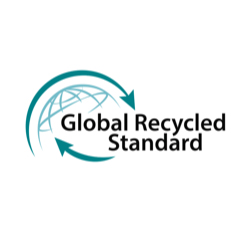- Clothes
- Bags
- Accessories
-
Inspiration
- Shoes

The Global Recycled Standard (GRS) is an international, voluntary standard with requirements for third-party certification of recycled input and chain of custody. The GRS was originally developed by Control Union Certifications (CU) in 2008 and ownership was passed to Textile Exchange in 2011.
The main goal of the GRS is to increase the use of recycled materials. Moreover, the other goals of GRS are:
The certification is intended to meet the needs of companies looking to verify the recycled materials in their products. Furthermore, they focus on environmental and chemical processing and safe and equitable workingconditions. This applies to finished and intermediate products. This includes companies in ginning, spinning, weaving and knitting, dyeing and printing and stitching in more than 50 countries.
The Global Recycled Standard is intended for use with any product that contains at least 20% Recycled Material.
Find out what's the story behind your clothing by understanding the certificates. Use the scores to discover at a glance what a certificate means in different sustainability areas.
“If it can’t be reduced, reused, repaired, rebuilt, refurbished, refinished, resold, recycled, or composted, then it should be restricted, designed or removed from production.”
The criteria for environmentally friendly production apply at GRS for every step of the production process. It is always the case that the company must meet the criteria of GRS or local law, the strictest rules apply. GRS also checks that production is completely legal. That the local law is complied with and all permits are up-to-date.
The main environmental criteria of GRS are:
Score: 2/4 The amount of recycled material can are quite low, namely only 20%. In addition, there are criteria for environmentally friendly production, but there are no hard limits, it must above all be in accordance with the law and be free of toxic materials.

The GRS social criteria also apply to every step of the production chain. Here too, they check that production is in accordance with local law if those rules are stricter than those of the standard.
The main criteria of GRS in the social field are:
Score: 3/4. GRS defined multiple requirements on social production, from clean and safe working conditions to the right to the freedom of association. Though, they do not score all points as they are for instance not arguing voor a living wage rather than a minimum wage.

The GRS does not include any requirements or advice on animal friendly or cruelty-free production.
Score: 0/4
Textile Exchange releases a report on the Global Recycled Standard every 4 years. The report includes all the updated requirements. The latest report is from 2017 (Global Recycled Standard 4.0) and in 2021, a new report will be released. The reports are free and available for everyone online. The reports do not focus on the improvements of the certified GRS parties.
Score: 2/4. The reports are freely available, though only released once every 4 years. The report clearly outlines the GRS requirements but could also focus on the results and improvements of the certified parties.
GRS has an international working group with various members from many different organisations, from GOTS to Control Union to H&M. In general, GRS is a third-party certification system. The audits are done by SCS global services, including on-site inspection of the facility in the process of applying for certification. After receiving the certificate, SCS requires annual surveillance audits to maintain the certification.
Score: 3/4. GRS is a third-party certification with a varied working group and annual audits. Though, the report does not review anything on these audits and their outcomes.
Together we can make a difference! Subscribe to the newsletter to stay up to date about fair and sustainable fashion. We plant a tree for every subscription! 🌳